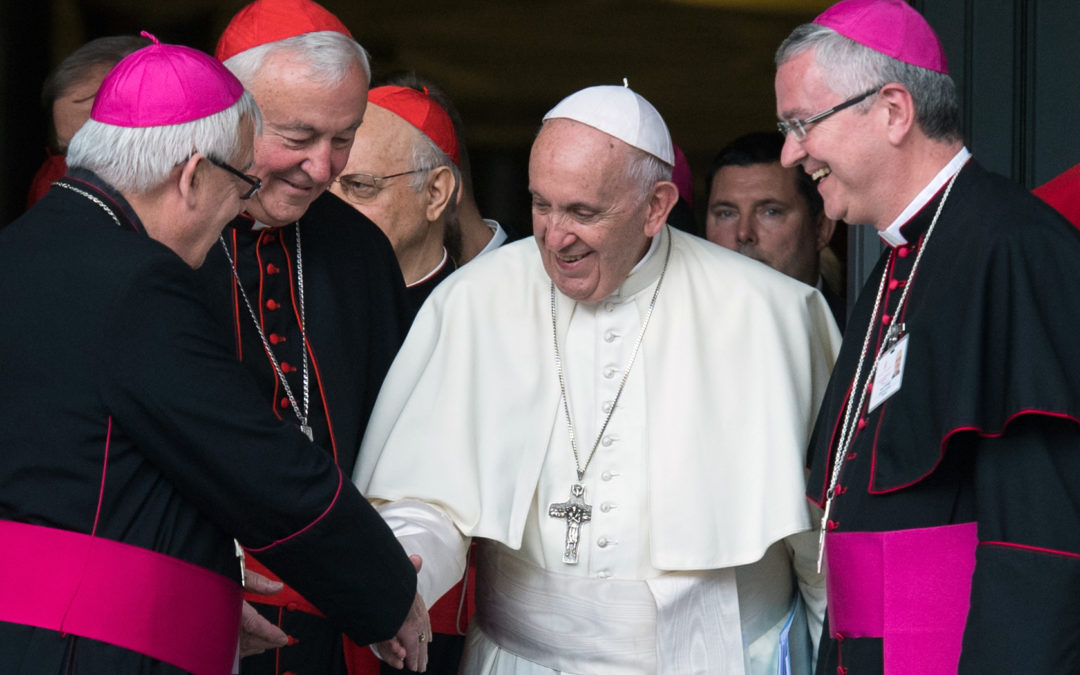In August this year, Pope Francis announced a new catechesis series focusing on healing the world from the physical and social ills related to the coronavirus pandemic. The Holy Father has used this series to express concerns about the economy, the environment, illness, death and sin, and he has encouraged people around the world to respond to the challenges with faith and hope. There are nine catechesis which focus on key themes in Catholic Social Teaching. They are worth reading in full but here are some extracts:
To heal the world we must keep our gaze firmly fixed on Jesus (see Heb 12:2). Within the Christian tradition, faith, hope and charity are much more than feelings or attitudes. They are virtues infused in us through the grace of the Holy Spirit (see CCC, 1812, 1813): gifts that heal us and that make us healers, gifts that open us to new horizons.
Faith and human dignity The pandemic has highlighted how vulnerable and interconnected everyone is. If we do not take care of one another, starting with the least, with those who are most impacted, including creation, we cannot heal the world.
The preferential option for the poor and the virtue of charity The pandemic has exposed the plight of the poor and the great inequality that reigns in the world. We now have an opportunity to build something different. We can nurture an economy of the integral development of the poor, and not of providing assistance.
The universal destination of goods and the virtue of hope In this time of uncertainty and anguish, everyone is invited to welcome the gift of hope that comes from Christ. If we take care of the goods that the Creator gives us and put what we possess in common in such a way that no one would be lacking, then we would truly inspire hope to regenerate a more healthy and equal world.
Solidarity and the virtue of faith As a human family we have our common origin in God; we live in a common home and have a common destination in Christ. In the midst of crises, a solidarity guided by faith enables us to translate the love of God in our globalized culture, not by building towers or walls, but by interweaving communities and sustaining processes of growth that are truly human and solid.
Love and the common good A virus that does not recognize barriers, borders, or cultural or political distinctions must be faced with a love without barriers, borders or distinctions. We need to improve our social love with everyone’s contribution, starting from our littleness.
Care of the common home and contemplative dimension To emerge from a pandemic, we need to look after and care for each other. We must support those who care for the weakest, the sick and the elderly and extend this care to our common home: to the earth and to every creature.
Subsidiarity and virtue of hope To emerge better from a crisis like the current one, which is a health crisis, and at the same time, a social, political and economic crisis, each one of us is called to share the responsibility. All the parts of a body are necessary, as Saint Paul says, those that may seem the weakest and least important, in reality are the most necessary (cf. 1 Cor 12:22).
Preparing the future together with Jesus who saves and heals We need to generate good policies, design systems of social organisation that reward participation, care and generosity, rather than indifference, exploitation and particular interests. A participatory society – where the “last” are taken into account just like the “first” – strengthens communion. A society where diversity is respected is much more resistant to any kind of virus.

